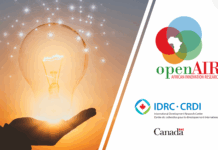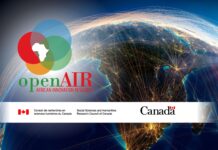By Nagham El Houssamy and Nadine Weheba
This is part three in a three part series. For part one, click here. For part two, click here.
Monumental advances in technology are impacting human lives, including in Africa. Fourth industrial revolution (4IR) technologies, data, and artificial intelligence (AI) feature prominently in initiatives conducted at Open AIR hubs across Africa and in Canada. Open AIR is conducting groundbreaking research related to AI and gender equality, AI’s future impacts on youth employment, and the inclusion of marginalized communities in African AI policy.
Through thematic research on high technology hubs, informal innovation, and indigenous entrepreneurship in Africa, Open AIR is taking steps toward advancing an emerging research agenda on AI for development. With this research, we are tackling questions related to AI and gender equality, AI’s future impacts on youth employment, and the inclusion of marginalized communities in African AI policies.
In the third and final part of this series, we turn to our two joint Southern African hubs, the Intellectual Property Unit (IP) at the University of Cape Town (UCT), and the University of Johannesburg, South Africa. We then turn to our Canadian hub, the Centre for Law, Technology and Society at the University of Ottawa.
Briefs on 4IR Tech in Africa
At the IP Unit at the University of Cape Town (UCT), fourth industrial revolution (4IR) activities fall under four tracks. The first of these takes off with a series of briefs on the intersection of intellectual property and compelling 4IR technologies such as artificial intelligence (AI) and blockchain, with an emphasis on the African context. The first brief in this series will be available soon on the IP Unit’s website. The objective is to highlight key issues on the topic and include suggested readings for those looking to explore further. The team at UCT, under the guidance of Founding Director and Open AIR Co-Principal Investigator, Tobias Schonwetter, is also aiming to produce a series of blog posts and other publications based on this brief, hoping to garner further interest in the topic. Issues of gender in artificial intelligence are also under investigation at the IP Unit as a second brief. This brief will involve the team conducting scoping research on the topic while adopting a gendered perspective to knowledge governance and its relationship to data.
AI and Education
On the teaching front, a new Cyberlaw LLB course was piloted in 2019 at UCT, integrating core elements of AI discussions. The course is jointly taught by Schonwetter, Bram Van Wiele, and Douglas Gichuki. It tackles topics such as consumer and data protection, cybercrime, AI consequential decision making, and ethics.
Artificial intelligence and machine learning will also be a central focus of the UCT law faculty’s newly established Law Tech Lab. Founded by both the IP Unit and the Democratic Governance and Rights Unit, the lab aims to engage students and tackle legal issues pertaining to 4IR and digitization, as it unfolds in the contexts of Africa. Multifaceted inclusion, including affordability and access to justice in light of the 4IR are key themes.
4IRSA & the Digital Economy Summit
Open AIR partners at the University of Johannesburg (UJ) are active on several different fronts in the area of AI and 4IR. UJ is one of the founding partners of 4IRSA, a collaboration bringing together stakeholders from across academia, industry, civil society, and government in conversations and initiatives pertaining to AI and its impact on society. 4IRSA’s latest activities include the ‘Digital Economy Summit 2019’, which took place on 5 July 2019 in Johannesburg. Open AIR’s informal sector innovation theme leader, Erika Kraemer-Mbula, has been part of the Summit’s operations committee over the past year. The Summit brought together representatives from a range of national stakeholders and international experts in conversations about 4IR in the context of South Africa. The even particularly focused on inequality, in light of ongoing digital transformations. The event garnered significant media attention, with speeches from prominent speakers, including South Africa’s President Cyril Ramaphosa and Dr. George Friedman, geopolitical forecaster and strategist.
Leading the Way in Research
Kraemer-Mbula was recently awarded the DST/NRF/Newton Fund Trilateral Research Chair in Transformative Innovation, the 4th Industrial Revolution and Sustainable Development, which is a partnership between the University of Johannesburg, the University of Sussex (UK), and the African Centre for Technology Studies (ACTS) in Kenya. The research program under her Chair started on 1 July 2019 and entails a strong capacity building component with PhDs, postdocs, and young researchers. It requires working closely with policy makers in policy experimentation over the next few years.
Fieldwork is also underway at UJ, where partners are gathering empirical data on the different modalities and uses of 4IR technologies in manufacturing processes and the implications this has on skills development in South Africa. Through firm level case studies, their research examines the incidence and use of technologies and skills as well as the challenges and opportunities faced. Accordingly, recommendations for education and the skills training necessary to prepare South Africa for the impact of the fourth industrial revolution will be put forward. Outputs are expected toward the end of 2019.
Canada, AI, IP, and Gender
In Canada, Open AIR’s hub is located within the Centre for Law, Technology and Society (CLTS) at the University of Ottawa (uOttawa). The Canadian hub of Open AIR mainly conducts research on the intersection of AI with the topics of gender and intellectual property (IP). These activities are driven by strong partnerships across Open AIR hubs and emerging projects with private sector collaborators.
A key area of research interest is the gendered perspective of IP and AI in Africa. One member of Open AIR’s New and Emerging Researchers Group (NERG), Akkila Thirukesan, has been conducting preliminary research into the areas of AI, IP, and gender. Recently, she travelled to Cape Town, South Africa, and spent a month as a visiting student at the IP Unit’s Hub at UCT. While there, she engaged with professors, PhD and LLM students, learning their insights on South Africa’s IP system. Her preliminary research has concluded that more focus has to be placed on the integration of diverse perspectives, specifically of women, in order for AI to beneficially contribute to Africa’s innovation and growth. The absence of such perspectives could lead to AI contributing to inequality, not reducing it. Akkila wrote a blog post for Open AIR about on her initial understanding of this topic, which can be found here. Since then, she has been working cross-continentally with our partners in Cape Town, joining a gendered balance research team in the areas of AI, IP, and gender in Africa.
African Research Informing Canada
In addition, others at the uOttawa hub are exploring other IP issues around AI. PhD student Sarit Mizrahi, for example, is in the midst of writing a doctoral thesis on copyright in machine-authored works. Open AIR co-Principal Investigator, Jeremy de Beer and uOttawa JD student, Sara Crothers, are commencing work in collaboration with a leading AI company to analyze key AI-related patent families and their implications for business, law, and policy in both Canada and African countries. By learning from the research at other Open AIR hubs, de Beer and his team are finding lessons for Canadian AI policies.
We Robot Coming to Ottawa
In 2020, uOttawa will host the renowned We Robot conference. This will be the first time this interdisciplinary gathering will take place outside of the United States. Open AIR network members plan to participate and hope to inject distinctly African perspectives into the global discussions on AI-related academic and policy issues.
The Next Steps for Open AIR
Moving forward, Open AIR researchers will continue to find synergies between and integrate activities going on at each hub to advance our AI-related research agenda in Africa and globally. The dynamic nature of research taking place at Open AIR hubs means 4IR technologies and their developmental impacts will continue to gain prominence within hubs’ individual research agendas as well as for the partnership in general.
As the fourth industrial revolution unfolds in Africa, Open AIR hopes to work with stakeholders on relevant empirical research to help shape science, innovation, and technology policy-making to the benefit of Africa. Globally, Open AIR researchers hope to continue to bring the voice of Africa to global technology debates on this cross cutting subject, impacting all aspects of our daily lives.
By forging new partnerships and collaborations, Open AIR will also continue to develop new scholarly insights, policy recommendations for governments, and best practices for businesses around AI and other 4IR technologies.










